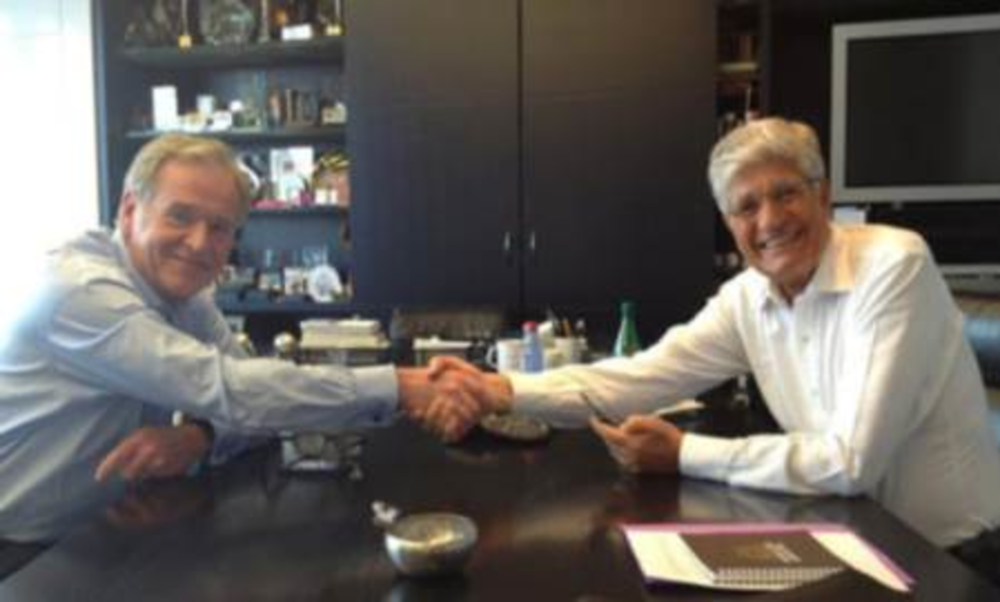So the John Wren/Maurice Levy bromance is officially over before it had the chance to be consummated – and the sound of sniggering and “I told you so” from WPP CEO Martin Sorrell is almost palpable.
The two holding companies admitted defeat Thursday night after the so-called $35 billion “merger of equals” that would have created the world’s largest marketing services company showed signs of dragging on beyond a year and damaging confidence in both networks. Sorrell’s comment was restricted to four words: “Eyes bigger than tummy.”
As soon as the deal was announced in Paris last July, Sorrell urged his troops to take advantage of the inevitable period of uncertainty that would ensue by aggressively targeting the top clients and talent of Publicis and Omnicom – with some subsequent success.
The deal, unveiled with much fanfare on the Champs Elysées, made sense to proposed OmniPub co-CEOs Levy and Wren: with the former seemingly viewing the deal as an appropriately grand statement with which to presage the end of his career, and the latter looking forward to taking over as sole CEO after an initial 30-month dual-leadership period between the two.
As predicted exclusively in PRWeek‘s initial coverage of the deal, a joint management meeting was held in Miami last year from October 17-21 to “give Publicis Groupe and Omnicom executives the opportunity to get to know each other both socially and professionally, and to begin to learn more about their respective networks and agencies.”
Seventy-four network agency heads, chief creative officers, and other senior executives from the respective groups attended the meeting, including MSLGroup CEO Oliver Fleurot; Dale Adams, chairman and CEO of Omnicom’s Diversified Agency Services unit (DAS); Sally Williams, global president, business development and client relations at DAS; and Ray Kotcher, former CEO and now chairman of Omnicom’s second-largest PR shop Ketchum.
But one well-informed industry observer told me that the more the two players peeled back the economics of the deal in terms of the relative efficiency and margins of the respective networks, that’s when the real discussions started. The more centralized approach favored by Publicis helped it achieve higher operating profit margins than its rival – 16.5 percent last year as opposed to 12.5 percent at Omnicom.
Omnicom was rightfully regarded as the bigger beast in the “merger of equals”, but the margin differential was one factor that showed just because you are bigger doesn’t mean you can easily own the show.
This was perfectly illustrated by the tensions between Omnicom CFO Randall Weisenburger and Publicis’ CFO Jean-Michel Etienne, with each network strongly pitching for their man to be the one to take the pivotal top financial job in the merged entity.
One wonders why these issues weren’t settled before the deal was struck on that balmy day in the French capital last July, and the tensions and arguments culminated in a joint statement Thursday night that the merger had been called off “by mutual agreement, in view of difficulties in completing the transaction within a reasonable timeframe.” The firms released each other from all termination fees, so neither will have to pay the $500 million penalty written into the contract.
“The challenges that still remained to be overcome, along with the slow pace of progress, created a level of uncertainty detrimental to the interests of both groups and their employees, clients, and shareholders,” Levy and Wren said in a statement. “We have thus jointly decided to proceed along our independent paths. We, of course, remain competitors, but retain a great deal of respect for one another.”
PR was never a game-changing part of this deal, making up as it did just 9-10% of the networks’ total revenues, so the likes of Fleishman-Hillard, Ketchum, Porter Novelli, and MSLGroup will continue much unchanged – though there may be the odd senior executive within these agencies bemoaning the disappearance of a nice cash windfall from the deal.
But you can guarantee that one person was left smiling broadly: in fact, for a short period of time Thursday night’s collapse of the deal probably made WPP’s Martin Sorrell the happiest man in the world.








